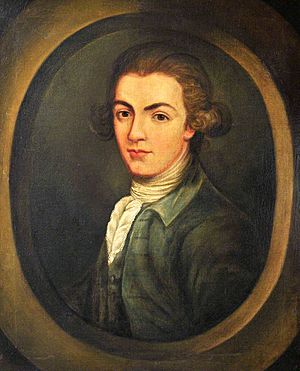Edward Clive, 1st Earl of Powis facts for kids
Quick facts for kids
The Earl of Powis
|
|
|---|---|
 |
|
| Lord Lieutenant of Ireland | |
| In office 21 November 1805 – 12 March 1806 |
|
| Monarch | George III |
| Preceded by | The Earl of Hardwicke |
| Succeeded by | The Duke of Bedford |
| Personal details | |
| Born | 7 March 1754 Queen Square, Bloomsbury, London, England |
| Died | 16 May 1839 (aged 85) 45 Berkeley Square, London, England |
| Resting place | Bromfield Parish Church |
| Spouse |
Lady Henrietta Herbert
(m. 1784; died 1830) |
| Children |
|
| Parents | Robert Clive, 1st Baron Clive Margaret Maskelyne |
| Alma mater | Eton College Christ Church, Oxford |
Edward Clive, 1st Earl of Powis (born March 7, 1754 – died May 16, 1839), was an important British politician. He was known as the Lord Clive for many years. He served in the House of Commons, which is like a main part of the British Parliament, from 1774 to 1794. Later, he was given a special title called a peerage, which meant he could sit in the House of Lords.
Contents
Edward Clive's Early Life
Edward Clive was the oldest son of Robert Clive, 1st Baron Clive. His father was very famous for his work in India and was often called "Clive of India." Edward was born in a part of London called Queen Square, in Bloomsbury. For his education, he went to two well-known schools: Eton College and Christ Church, Oxford University.
Becoming a Politician
When his father passed away in 1774, Edward became the Baron Clive. This was an Irish peerage, which meant it gave him a title in Ireland. However, it didn't automatically give him a seat in the main British House of Lords.
So, in 1774, he was elected as a Member of Parliament (MP) for a place called Ludlow. He held this position until 1794. During this time, he also became a member of the Board of Agriculture in 1793. This board helped with farming and land use.
In 1794, Edward Clive was given a new title: Baron Clive, of Walcot in Shropshire. This new title was a Peerage of Great Britain, which meant he could now take his seat in the House of Lords in Britain. Many people thought this was a way for the King to finally show proper respect to his famous father, Robert Clive.
Important Roles and Achievements
Edward Clive had a very successful career, especially in India. From 1798 to 1803, he served as the Governor of Madras. This was a very important job, overseeing a large area in India. When he returned home, both parts of the British Parliament thanked him for his excellent work.
In 1804, he received even more important titles. He became Baron Powis, Baron Herbert, Viscount Clive, and most importantly, Earl of Powis. This was a special honor, bringing back a title that had ended a few years earlier.
Besides his time in Parliament and India, Edward Clive also held other significant roles:
- He was the Lord Lieutenant of Shropshire from 1775 to 1798, and again from 1804 until his death in 1839. A Lord Lieutenant is the King's or Queen's personal representative in a county.
- He was also the Lord Lieutenant of Montgomeryshire from 1804 to 1830.
- He served as a "Recorder" (a type of judge) for the towns of Shrewsbury and Ludlow.
Edward Clive also played a role in the military. He was a colonel in the Shropshire Militia, which was a local army force. In 1797, his militia was sent to Scotland to help keep peace and order.
His Family
In 1784, Edward Clive married Lady Henrietta Herbert. She was from Powis Castle, a famous place. They had four children:
- Lady Henrietta Antonia Herbert
- Edward Herbert, 2nd Earl of Powis, who later inherited Powis Castle.
- Lady Charlotte Florentia Herbert, who became the governess (teacher and caregiver) for the future Queen Victoria.
- Robert Henry Clive, who also became a politician.
Lord Powis lived at Walcot Hall, a large estate his father had bought. Lady Powis passed away in 1830. Lord Powis lived for nine more years, dying at his home in London in 1839 at the age of 85. He was buried at Bromfield Parish Church. People remembered him as a very strong person, even in his old age. It was said that when he was about eighty, he could still be seen digging in his garden early in the morning!
 | John T. Biggers |
 | Thomas Blackshear |
 | Mark Bradford |
 | Beverly Buchanan |

